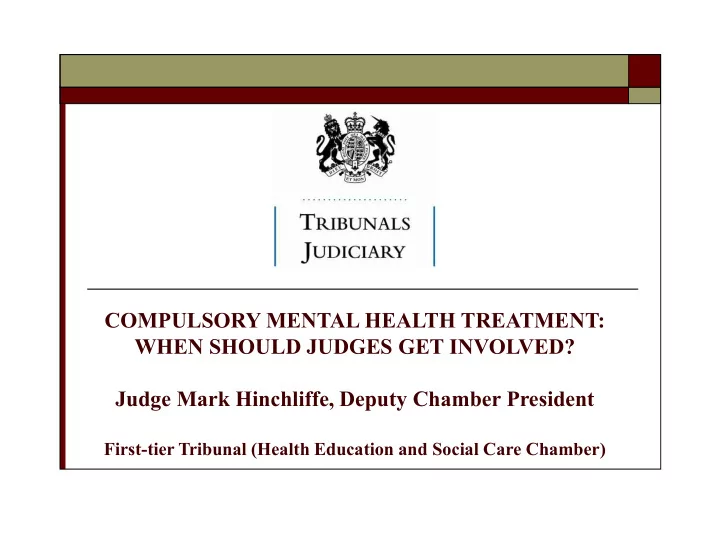

COMPULSORY MENTAL HEALTH TREATMENT: WHEN SHOULD JUDGES GET INVOLVED? Judge Mark Hinchliffe, Deputy Chamber President First-tier Tribunal (Health Education and Social Care Chamber)
Three key stages Mental Health Act 1959 Mental Health Act 1983 Mental Health Act 2007 Tribunals, Courts and Enforcement Act 2007
An Adversarial Tribunal A case between parties, with the tribunal adjudicating upon the dispute, under a national structure and clear judicial leadership.
The principal function of the tribunal to provide a mechanism to review the continued need for detention in hospital for the assessment of, and medical treatment (including compulsory treatment) for, any serious mental disorder.
Figures for 2016-17 over 32,000 applications and automatic referrals received with 25,000 cases listed for hearing at around 1,000 different venues.
The English Regime does not involve the tribunal or a District Judge at the admission stage. Instead, an Approved Mental Health Professional (AMHP) takes the lead. The application is founded on two medical recommendations.
Once detained, a Section 2 patient has an immediate right to apply to the tribunal to be discharged. The application must be made within the first 14 days of the 28 day period, and the tribunal must then try to hear the case within 7 days of receiving the application.
Once detained, a Section 3 patient can apply to the tribunal to be discharged once in every period (i.e. 6 months, 6 months, and then every year) and if no application is made, the patient’s case is automatically referred to the tribunal at the end of the first 6 months and then every 3 years thereafter.
The tribunal decides whether or not the grounds for continued detention are made out, as at the date of the hearing. The onus is upon the detaining authority to demonstrate that the criteria for continued detention are established. The standard of proof is the balance of probabilities.
MD v Nottinghamshire Health Care NHS Trust [2010] UKUT 59 (AAC)
SH v Cornwall Partnership NHS Trust [2012] UKUT 290 (AAC)
MD v Mersey Care NHS Trust [2013] UKUT 127 (AAC)
Relevance of ‘Capacity’ The UK charity ‘MIND’ asks should we force treatment on someone with capacity to refuse it, even if their decision was objectively unwise, and detrimental to their health
A requirement that patients should lack capacity to decide such matters for themselves would (it has been argued) better achieve parity with how physical health problems are managed, and place far greater emphasis on the patient’s right to choose for himself or herself.
In Scotland The equivalent of the Mental Health Act 1983 includes an additional requirement of significantly impaired decision-making in relation to treatment for mental disorder.
Risk to Others Apart from terrorists, sex offenders and mental health patients, society does not usually sanction pre-emptive judicial interventions in the interests of crime prevention.
A serious mental disorder is one where serious risk of grave harm to the patient or others is very likely to arise as a consequence of it, is likely to twist reality and distort truth, and may therefore be inconsistent with a patient truly having ‘capacity’.
Questions?
Recommend
More recommend